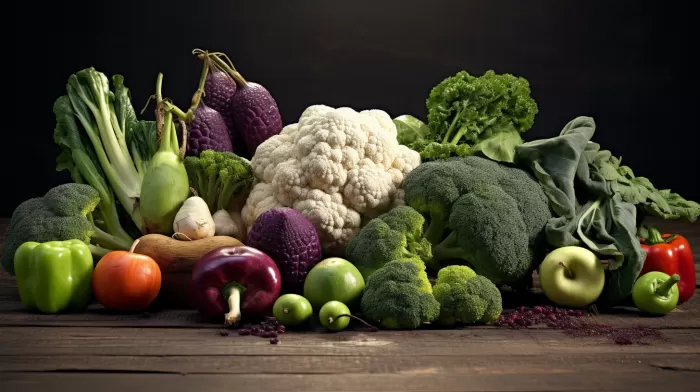Winter is here, which means our immune systems are working overtime. As the immune system tackles colds, the flu, and other viruses, it needs to operate at peak efficiency to keep us healthy. In addition to fending off viruses, the immune system is designed to eliminate other harmful substances from our bodies, such as bacteria, fungi, and cancer cells. Ensuring your immunity is running at maximum capacity can help prevent bacterial infections and other health problems. By changing your diet and using some of nature’s antibiotics, you’ll be better prepared to stay healthy this winter.
Diet: The importance of fruits and vegetables
Fruits and vegetables are essential for boosting the immune system. They are rich in vitamins, minerals, antioxidants, and other compounds that help keep pathogens under control. When choosing fruits and veggies, opt for colorful varieties, as the pigments that give them their hue also provide numerous health benefits.
Cruciferous vegetables, such as cauliflower, broccoli, and kale, are particularly recommended. These powerhouse veggies are abundant in antioxidants that not only help improve immunity, but also modulate genes associated with immunity and control the harmful bacteria in the gastrointestinal tract. Additionally, sulforaphane, a compound found in broccoli, has been shown to fight cancer.
Probiotics: Supporting good bacteria
While eliminating harmful bacteria is important, it’s also crucial to nurture the good bacteria in your body. Many recent studies have shown that beneficial microbes contribute to healthy digestion, metabolism, mental health, and overall strong immunity.
Maintaining a healthy gut flora is essential since the gut is a primary entryway for dangerous pathogens. Consuming probiotic-rich foods like yogurt, kimchi, sauerkraut, and kefir can help support the beneficial bacteria in your gut, providing total-body health benefits.
Vital vitamins and minerals
Zinc, an essential component of many immune cells, plays a crucial role in maintaining a strong immune system. Research has demonstrated that supplementing with zinc can reduce the risk of infection, particularly for those who are zinc deficient.
Vitamins A, B, C, and D are also important to the immune system. Although vitamins’ immune-boosting effects have not been proven in humans, many vitamins provide protective antioxidant benefits. One interesting study found that individuals who consumed fruit and vegetable juices saw an increase in their T-cell count and reduced damage to their immune cell DNA.
Nature’s antibiotics
Wintertime is synonymous with cold and flu season. However, it is important to remember that antibiotics only target bacterial infections and are ineffective against the flu and other viral infections. Nevertheless, having natural antibacterial ingredients on hand can defend against co-infections and support your overall immune health.
Here is a list of herbs and foods with natural antibiotic and immune-boosting properties:
- Cinnamon
- Clove
- Echinacea
- Garlic
- Honey
- Sage
- Usnea
- Yarrow
- Oregano
If you’re unsure whether you’re experiencing a viral or bacterial infection, it’s essential to consult your healthcare practitioner.
Exercise and mindfulness
When life gets hectic, it’s easy to let your exercise routine fall by the wayside. Unfortunately, as our schedules become busier, we experience more stress, and exercise is one of the most effective ways to combat it. Chronic stress can cause the body to overproduce cortisol and other inflammatory hormones, weakening the immune system.
In addition to exercise, practicing mindfulness and meditation can also help manage stress. Taking just a few minutes each day to focus on your breath and calm your mind can be extremely beneficial.
In conclusion
Supporting our immune systems is not about finding a magic solution, but rather incorporating healthy habits into our daily lives. By focusing on nutrition, sleep, exercise, and stress management, we’ll give our immune systems the best chance at success and enjoy better health all year round. For more health and wellness information, visit Dr. Eliaz’s website.



